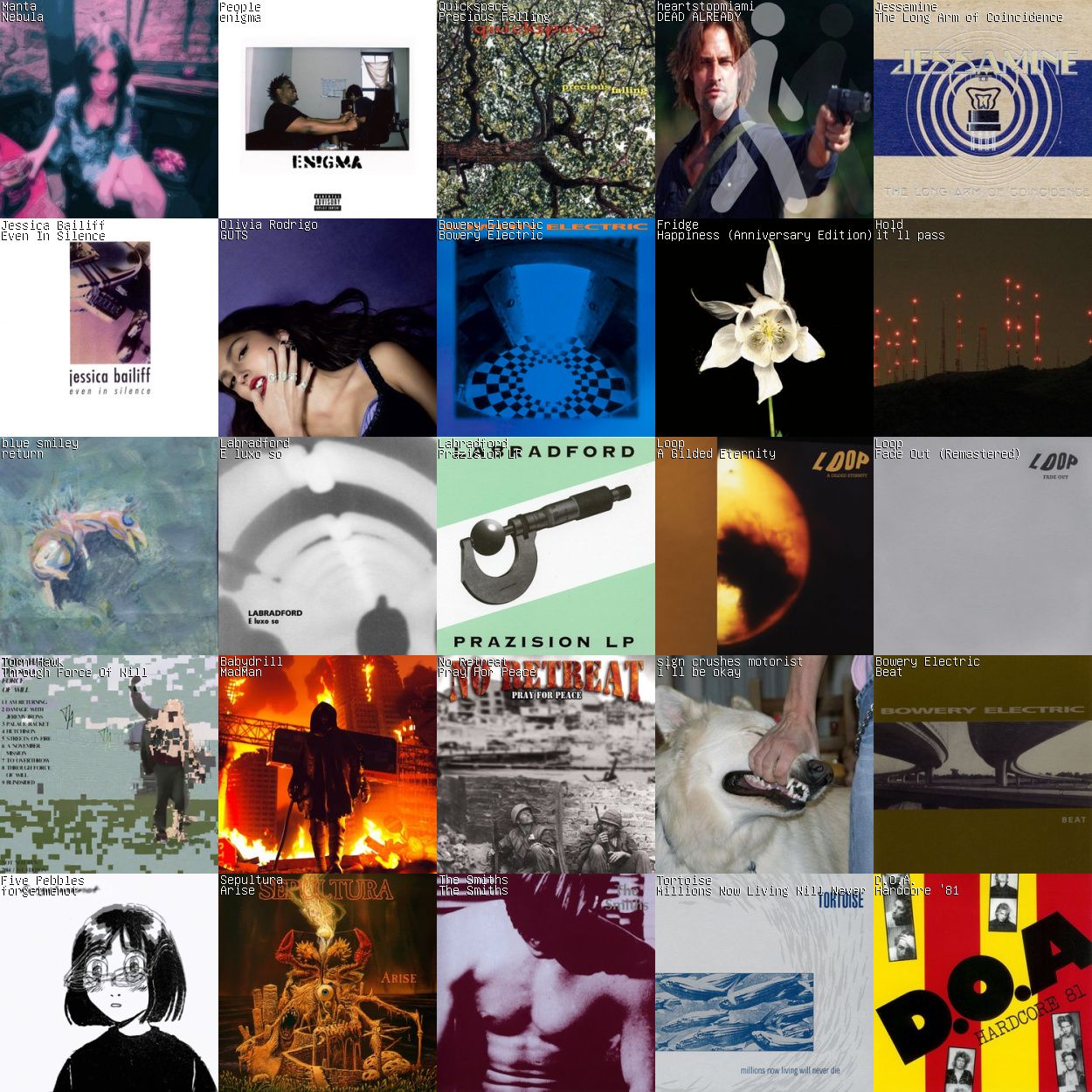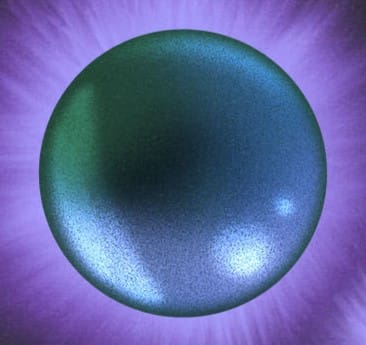My Listening Week: Hold, Manta, Five Pebbles, Olivia Rodrigo, Steve Roden
Thoughts on slowcore, ambient, shoegaze, Olivia Rodrigo, and a tribute to Steve Roden.

I've had a lot of fun listening to music over the last couple weeks. For some reason, I felt like I was in a bit of a musical rut throughout August. I was preoccupied with some other shit in my personal and work life, and felt like my active discovery was stagnating outside of hardcore. Within the last two weeks, I've read several inspiring books — Fearless: The Making of Post-Rock, You're With Stupid: Kranky, Chicago and the Reinvention of Indie Music, and Simon Reynolds' essay collection, Blissed Out: The Raptures of Rock — that have reinvigorated my passion for post-rock, ambient, shoegaze, slowcore and beyond.
This week, I did some purposeful digging around the internet for new (to me) shoegaze, and ended up falling down some rabbit holes I've been having a ball exploring. I've also been listening to a shit-ton of Nineties and early 2000s post-rock (Tortoise, Fridge, Godspeed You!, Labradford, Quickspace) that I don't have much to say about at the moment, but that I've been thoroughly, thoroughly enjoying. But below, are the projects from this week's diet that I felt like writing about.
hold - it'll pass
hold is one of many monikers that this 18-year-0ld Irish musician Liam McCay records under. His most popular project is Sign Crushes Motorist (yes, like the Duster song), but he's also put out well-liked stuff as Birth Day, Take Care, Miserable Teens Club and more. Collectively, this guy must be raking in millions of monthly Spotify streams across his many aliases, and while I don't love everything he's done, his consistency is wildly impressive.
Like Sign Crushes Motorist, hold is a slowcore band that's also undeniably indebted to Duster. The mix is smothered in tape hiss. The tempos are rudimentary and plodding. The high-end is usually made up of either toy-ish synths or grey-blue guitar strums. McCay's vocals are barely audible. A lot of slowcore sounds like someone croaking from a fetal position because they don't have the strength to pull themselves out of bed, but the songs on 2021's it'll pass EP literally sound like McCay tracked his vocals from under a weighted blanket.
There's no natural reverb or space for his bassy, buzzy murmurs to bounce around, and every guitar strum or vocal that raises above a whisper sounds like it's clipping. On the heavy-breathing climax of "Alone," the whole song vibrates like a heavy piece of furniture chattering precariously during an earthquake. Both it'll pass and hold's 2022 follow-up, give it time, remind me of the San Francisco band April Magazine, who share the same fascination with sound-dampening lo-fi pop songs that're cramped and muggy. The kind of music you just want to curl up inside and sweat out whatever troubles you're going through.
Manta - Nebula
Manta is another one of McCay's projects that really spoke to me this week. Whereas hold and Sign Crushes Motorist feel akin to overlooked, late-2010s Philly slowcore bands like Cooking and null, Nebula is McCay's ambient outlet. Ambient music is really difficult for me (or anyone, I imagine) to write critically about, because a piece either effectively conveys a mood or doesn't. It's kind of like a punk sub-genre like powerviolence in that sense. The genre's toolkit is pretty spartan and there's only so much you can say within the confines of the idiom, so the artist either pulls that feeling out of the listener or doesn't, with very little objective logic to what succeeds vs. what fails. Some ambient music bores the shit out of me, and some of it I find breathtakingly pretty and richly musical, and Manta falls into the latter category for me.
The songs on 2023's Nebula aren't complicated. In fact, even I — someone who's far from an ambient scholar — can identify that these are pretty simple, two-dimensional loops of ethereal synths dotted with occasional keyboard arpeggios or delay-ridden guitar pitter-patters. Could I make loops of a similar competency with my own pedalboard? Probably! But something about the entry-levelness of this I find charming. The YouTube comments on McCay's channel are clearly all written by teenagers who effusively praise this and everything he's ever done. One of them asks to use a song in the short film they're making. Another, with a photo of Pinkpantheress as their avi, comments, "This is ipod bound."
McCay already displays a pretty outstanding proficiency of slowcore (especially considering his age), and I'm sure his electronic mosaics will become more complex if he keeps at it. But there's an innocent instinctiveness to the songs on Nebula that really appeals to me. It brings to mind the early Blithe Field material, when Spencer Radcliffe was beginning to branch out from his own emo/slowcore roots to ambitiously dabble with sound collage and homespun synth drones. Sometimes, it's amateur artists, unchained from the complications of erudite musicianship, that produce the most relatably human material.
Five Pebbles - Forgetmenot
I didn't know this EP existed until this week and I'm kicking myself. Five Pebbles is the shoegaze side-project of Weatherday, the Swedish indie-rock multi-hyphenate whose 2019 emo-indie-art-pop masterpiece, Come In, might be one of the first quintessential Gen-Z indie albums. I love the topsy-turvy, genre-gobbling ride that Come In takes me on, but Forgetmenot might be even more engrossing to my particular sensibilities. This is dense, clattering, wallpaper-stripping noise-pop that ranks among the most forward-thinking shoegaze projects of our time.
Opener "down softly" is an army of brittle sound files that assemble with ant-like synergy to become 100x more powerful than the sum of their parts. This is sun-exploding music that's equally suitable for reveling in the indigo glimmer of the eternal moonlight that follows. "cat's tongue" invites galactic auto-tune and starcrushed synths to frolic alongside the tweeter-wrecking guitar wails, and "we know the devil" makes the same components bawl atop an 808-boosted, nodding beat. It sounds like staring into a fluorescent light bulb for 20 minutes straight and uploading the spirals of blinding whiteness into a DAW.
The midway between Astrobrite, Full Body 2, Sweet Trip and a little bit of Candy Claws for good measure, this EP blew my fucking mind. In fact, the first time I finished it I audibly chuckled and said to myself, "God-damn this is good!"
Olivia Rodrigo - GUTS
OK, I listened to this album once this morning, so here're my first impressions. I like it better than Sour, which I liked, I guess, but really just felt generally warm toward because "brutal, "driver's license" and "good 4 u" were undeniable. I was frustrated by the way people tried to position Olivia Rodrigo as the catalyst of the mainstream pop-punk revival that was actually being spearheaded by the monstrously corny Machine Gun Kelly. It feels like that moment has actually passed already, and I'm happy to hear her side-step any Simple Plan comparisons through the much rock-ier GUTS.
The three-fisted punch of "all-american bitch," "bad idea, right?" and "vampire" is a walloping opening, but the record does the thing Sour did during its second half when it seesaws between theatrical piano ballads and up-tempo outbursts. Though, the flow of this album feels more natural and less lopsided than Sour, which really lost me in the sea of slow-dancers that comprised its B-side. GUTS has more, a-hem, guts to it. The fuzzy, Breeders-y "ballad of a homeschooled girl" and the Meet Me in the Bathroom-era whiz-bang of "love is embarrassing" are genuinely fun. "get him back!" sounds like when Fall Out Boy tried rapping in the Save Rock 'N' Roll era, so that's a pass, but "pretty isn't pretty" is basically an Alvvays-style dream-pop song, and it works!
We're discussing this record on next week's Endless Scroll, so I'll have more to say then, but that's where I'm at right now on the biggest marquee pop record of the year thus far.
Steve Roden - "oionos"
I'm still very green when it comes to experimental music; musique concrète, noise, field recordings, onkyō and other forms of niche method music that publications like The Wire are known for championing. A lot of that stuff purposefully feels several arm's length from me, especially as a listener with roots in punk and indie-rock, and who's never had a friend to guide me through that sort of thing in my twenties (I never would've been interested before that).
That said, I can appreciate that sort of thing when it's presented to me in a straightforward way that reels back the pretension and naval-gazing snobbery that those scenes often attract, and earlier this year I read a book, Michael Tau's Extreme Music: Silence to Noise and Everything In Between, that opened my eyes to several styles of music I didn't even know existed, and in a really approachable, informative way. One of the movements the book documents is lowercase music, a style tepidly coined by the experimental composer Steven Roden, who sadly passed away earlier this week.
Out of all the fascinating sections of Extreme Music, the passage that's stuck with me most was about Roden's Forms of Paper album, a project he recorded by close-micing a bunch of pieces of paper and shuffling them about to get certain resonances — which don't actually sound like paper at all in the finished context. Roden intended for the album to be played at a very low volume, so that the stray flecks of sound were barely perceptible to the listener, and served as a type of atmospheric background music to the library setting the record was designed to be played in. He was upset, then, when his label mistakenly re-mastered the album without his knowledge, so that his sounds would be played at "normal" volumes, thus ruining their intended effect.
I'd never heard about a musician approaching music or sound in that way. I like a lot of ambient music, but this was a whole new level of purposeful quietude. Music that's supposed to be barely audible, and sounds that challenge the very idea of what music even is. I skimmed through a few other random releases in his catalog while reading the book, and the one that stuck with me most was "oionos," a composition Roden created for an art installation in Greece. It's an hour's worth of ambling flints of sound, mostly sampled from old toys and shaped into pleasantly creaky little bits of material that float around like driftwood near the shore's edge. The composition doesn't really develop or grow in any linear fashion, but it somehow manages to never get boring either.
I think it sounds pretty great turned up loud on my home stereo, but I'll respect Roden's methodology and listen to it a few notches lower than I think I should in the coming weeks. RIP.

